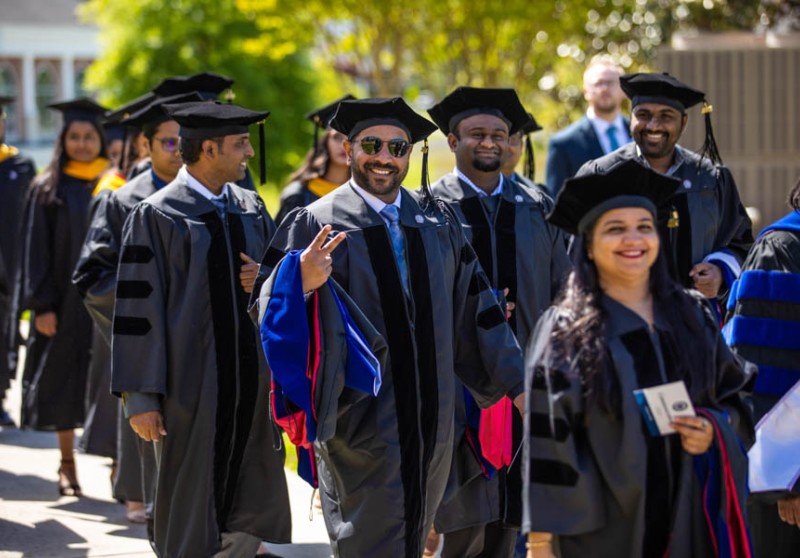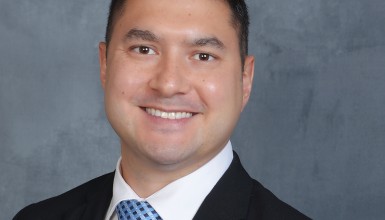Expand and guide your career through the world of computer science.
An Executive Master's in Computer Science degree will enable you to pursue expanded careers in computer programming, software development, and machine learning that require advanced knowledge in the area of software development. This hybrid degree program provides you with the hands-on skills you need to expand your options, earn a promotion, or pivot your career altogether. Courses taught by faculty who are currently working in the computer science field will give you the chance to demonstrate – and strengthen – your technical capabilities in advanced programming and software development. Whether you prefer software development, computer architecture, compiler theory, computer architecture, or computer networks, this executive master's in computer science degree offers solid foundational knowledge to help you achieve your goals.
By the Numbers
Programs & Requirements
Executive Master's in Computer Science
The field of computer science is expansive and rapidly evolving. There are endless careers available, but it takes relevant knowledge, practiced skill, and an understanding of advanced processes in order to achieve the highest level of success within those careers. If you’re looking to expand your opportunities and advance your computer science career, an executive master’s degree in computer science from Cumberlands could be exactly what you need.
You’ll study all the most important foundational concepts, such as computer architecture and design, algorithm and data structures, and advanced operating systems – all through hybrid classes taught by professors who are active in the field. From advanced programming languages, to advanced artificial intelligence, and more, this executive graduate program provides all the relevant information you need to build your computer science career.
Classes are scheduled in two eight-week sessions and 16-week sessions during the fall, spring, and summer semesters. Full-time degree candidates typically take one or two classes per bi-term, a total of 6-9 hours per semester.
Course Requirements
- MSCS 531 Computer Architecture and Design
- MSCS 532 Algorithm and Data Structures
- MSCS 533 Software Engineering and Multiplatform App Development
- MSCS 534 Principles of Cyber Security *cross-listed as MSCE 534 Principles of Cyber Security
- MSCS 535 Secure Software Development
- MSCS 630 Advanced Operating Systems
- MSCS 631 Advanced Computer Networks
- MSCS 632 Advanced Programming Languages
- MSCS 633 Advanced Artificial Intelligence
- MSCS 634 Advanced Big Data and Data Mining
- MSAI 699 Computer Science Capstone (1 hour) or INTR 599 Applied Learning Practicum (1 hour)
**Executive students may take MSAI 699 or INTR 599 as part of their program degree requirements. The Computer and Information Sciences Department, the School of Business, and the Leadership graduate (Masters and Doctorate) executive format programs have an applied learning component (internship/practicum) that is an integral (essential) part of the established curriculum. Due to the applied learning component required for the degree program, executive format students must enroll in INTR every term of enrollment.

Executive Student Resources
UC's Department of International Graduate Services enjoys providing support resources for our international students. Find tutorials and information regarding offices and policies for the International Graduate Students and programs.
Executive Program Format
Our Executive Programs include hybrid course days designed for international graduate students studying in the U.S., or domestic students seeking a hybrid-format program. We strive to incorporate professional experience and real-world application of course curriculum into our programs to enhance the learning experience. Practical Training is an integral part of program coursework and available to all students. At the University of the Cumberlands our degree programs focus on quality education at an affordable price.
Executive Program students take three (3) courses per semester. The program semester is based on the existing UC semester calendar, with three (3) annual semesters: fall, spring, and summer. Two of the courses each semester focus on the specific program content. Additionally, students will be required to attend an intensive residency weekend as part of their course enrollment each term. The third class includes an Applied Learning Practicum, in which students apply what they are learning in their other two courses to the real world via work or internship experiences.
Residency FAQs
Residency Session dates are determined by the course that you are registered for. It is very important that you make note of the class you registered for, as well as the designated residency weekend for that course as each course will only meet one weekend for the duration of the semester.
Even though we will only be meeting one weekend per semester, we will have the same number of contact hours with you. This will enable the instructors to make residency weekends much more valuable. This change will allow us to have meaningful projects on residency weekends.
You can view your semester schedule in your self-service portal in your Student Profile. Once you log into your MyUC account, click on Academics, then click on Current Schedule. Your schedule details will indicate the date and location of your residency weekend.
You can find information on the residency site locations on our website.
Yes, all three days are mandatory, and requests to arrive late or leave early will not be approved. Should you not be in attendance for the full session, you will be counted absent for the entire session. Please plan travel accordingly!
Attendance to each executive residency class session is mandatory. Students may make up no more than one (1) residency session throughout the duration of their academic program. Missing a second residency will result in the student being dismissed from the university.
A missed session will result in the student attending a make-up session, and paying a $300 residency make-up fee. In addition, the student may be asked for documentation from the program department providing an explanation as to why the scheduled residency session was missed. Make-up sessions must be completed prior to the end of the term. Noncompliance with this policy will result in dismissal from the executive program.
Make-up residency sessions will be held at our campus in Williamsburg, KY. You will be contacted with the time and dates after your absence is reported. There will only be one (1) residency make-up session offered each semester. Failure to attend all days of the makeup session will result in receiving a failing grade for the course, as well as potential dismissal from the University, and SEVIS termination.
If you cannot be in attendance for all three days then you will be counted absent for the entire residency weekend and be required to attend the make-up residency and pay the $300 make-up fee.
The Department of International Graduate Services will contact you via your UC student email as registration for the next term approaches. Please remember that you are required to register for (one) main class, (one) online class, and Applied Learning Practicum each semester in order to maintain your F1 status – late registration will not be accepted and can result in the termination of your student status.
Once you register for a class you will want to make note of the residency weekend that your class is scheduled, as that is the only session for that class that will be scheduled for the semester. You will need to be sure to plan your travel accordingly to ensure that you are in attendance for the full residency session.
Registration is done on a first-come, first-serve basis. Once a course is full, there will not be additional seats added, as we cannot exceed classroom seating capacity; therefore, it is advised that you register for classes as much in advance as possible. As a reminder, students cannot register for future semesters until their current tuition balance is paid in full.
*Please note all times are in local time zone*
Friday
Facility will open at 4:00 p.m.
Saturday
Facility will open at 7:00 a.m.
Sunday
Facility will open at 7:00 a.m.
We ask that you please take note of the above-mentioned times and schedule your travel accordingly.
*These dates have been set; however, if any changes are made, they will be made prior to registration for that semester. Not all dates are available at each residency location.
Fall 2023 (August 28 – December 15)
- September 29 – October 1
- October 6 – 8
- October 13 – 15
- October 20 – 22
- November 3 – 5
- November 10 – 12
- November 17 – 19
Spring 2024 (January 8th – April 26th)
- February 9 – 11
- February 16 – 18
- February 23 – 25
- March 1 – 3
- March 8 – 10
- March 15 – 17
- March 22 – 24
- April 5 – 7
Summer 2024 (May 6th – August 23rd)
- May 31 – June 2
- June 7 – 9
- June 14 – 16
- June 21 – 23
- June 28 – 30
- July 12 – 14
- July 19 – 21
- July 26 – 28
- August 2 – 4
Fall 2024 (August 26th – December 13th)
- September 27 – 29
- October 4 – 6
- October 11 – 13
- October 18 – 20
- October 25 – 27
- November 1 – 3
- November 8 – 10
- November 15 – 17
- November 22 – 24
Take the Next Step
Mission & Goals
The mission of the executive master’s degree in computer science is to equip students with the knowledge and skills required for professional careers in computer science.
Computer Science Careers & Outcomes
All stats from U.S. Bureau of Labor Statistics
Software Developer: $124,200
Software Developer: $124,200
Software developers design computer applications or programs. Software quality assurance analysts and testers identify problems with applications or programs and report defects.
Database Architect: $112,120
Database Architect: $112,120
Database administrators and architects create or organize systems to store and secure data.
Information Research Scientist: $136,620
Information Research Scientist: $136,620
Computer and information research scientists design innovative uses for new and existing computing technology.
Computer Network Architect: $126,900
Computer Network Architect: $126,900
Computer network architects design and implement data communication networks, including local area networks (LANs), wide area networks (WANs), and intranets.
Computer Systems Analyst: $102,240
Computer Systems Analyst: $102,240
Computer systems analysts study an organization’s current computer systems and design ways to improve efficiency.
Web Developer: $80,730
Web Developer: $80,730
Web developers create and maintain websites. Digital designers develop, create, and test website or interface layout, functions, and navigation for usability.
Common Questions about Computer Science
As technology becomes further integrated into our daily lives – and as it continues evolving – there will be a continuous need for computer science experts for the foreseeable future. Everything from online shopping to Big Data to robotics has its foundation in this field. By pursuing an executive master’s degree in computer science, you will be staying ahead of the curve of a rapidly changing field and helping ensure that you remain an asset to virtually any business.
Though many people use the terms interchangeably, there are differences between these two fields. In short, computer science typically has more to do with designing and building computer programs, applications, and software languages, whereas information technology focuses more on troubleshooting computers and their networks, systems, and databases. They are both “umbrella terms,” but it may benefit you to dig deeper into the differences as you research careers that would best fit your skills and interests.
Yes, this executive computer science program is offered in a hybrid format with a combination of online coursework and residency weekend sessions where students engage with professors in the classroom. Each course lasts eight weeks, called a bi-term. There are two bi-terms per semester, and three semesters per year (fall, spring, and summer). Many classes are asynchronous, meaning there is no set login time; you can work on coursework whenever you find time. Cumberlands provides free rental textbooks to students as part of its One Price Promise.
Yes. University of the Cumberlands programs are accredited through the Southern Association of Colleges and Schools Commission on Colleges (SACSCOC). Learn more about accreditation.
All programs at University of the Cumberlands are offered at some of the lowest rates in the nation – and we even include free textbooks through our One Price Promise! For more information on how affordable this program would be for you, visit our Financial Aid & Tuition page.

Executive Program Admission Requirements
All students in our executive programs are required to meet a standard set of admissions requirements for graduate students.
Faculty Experts in Computer Science
Learn more about the professors you will interact with.

Dr. Rajan Thapaliya

James T. Corcoran

Dr. Paul Czarapata
Dr. Paul Czarapata
Contact Information
Request Information
Let us know of any questions that you may have!

